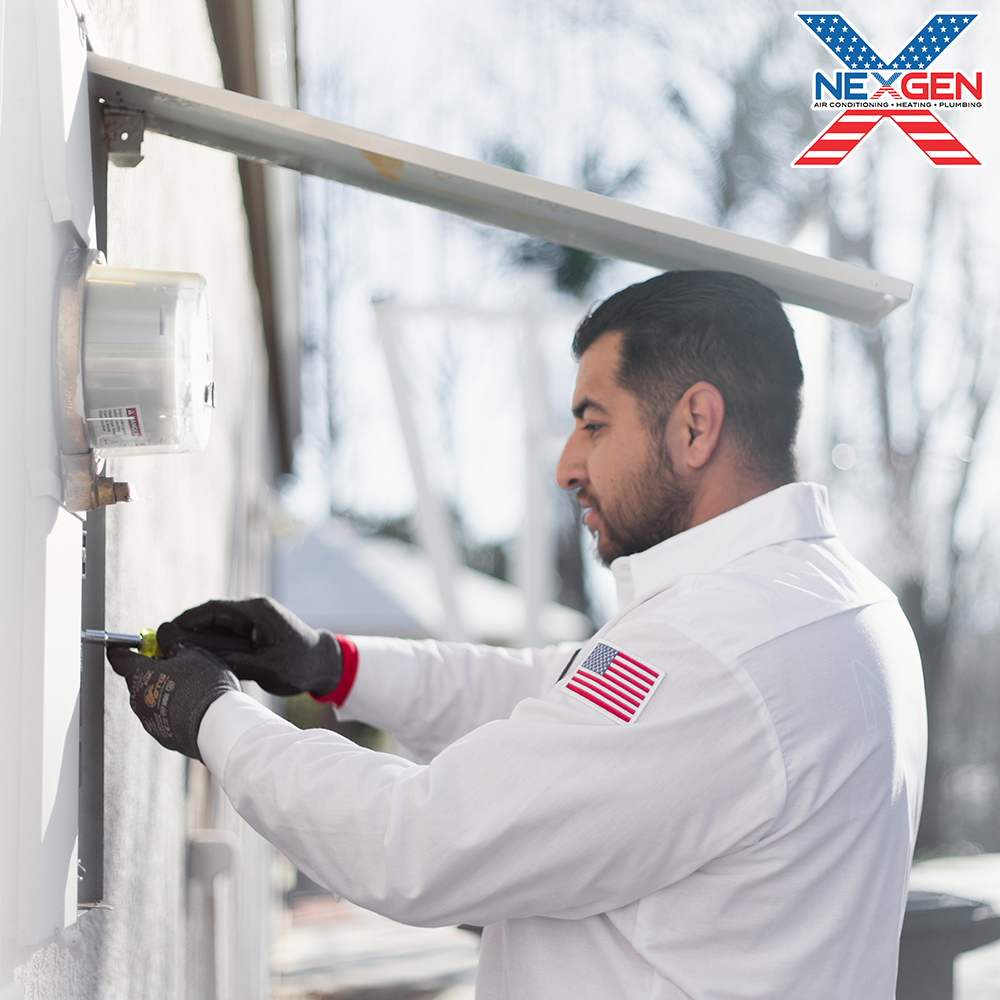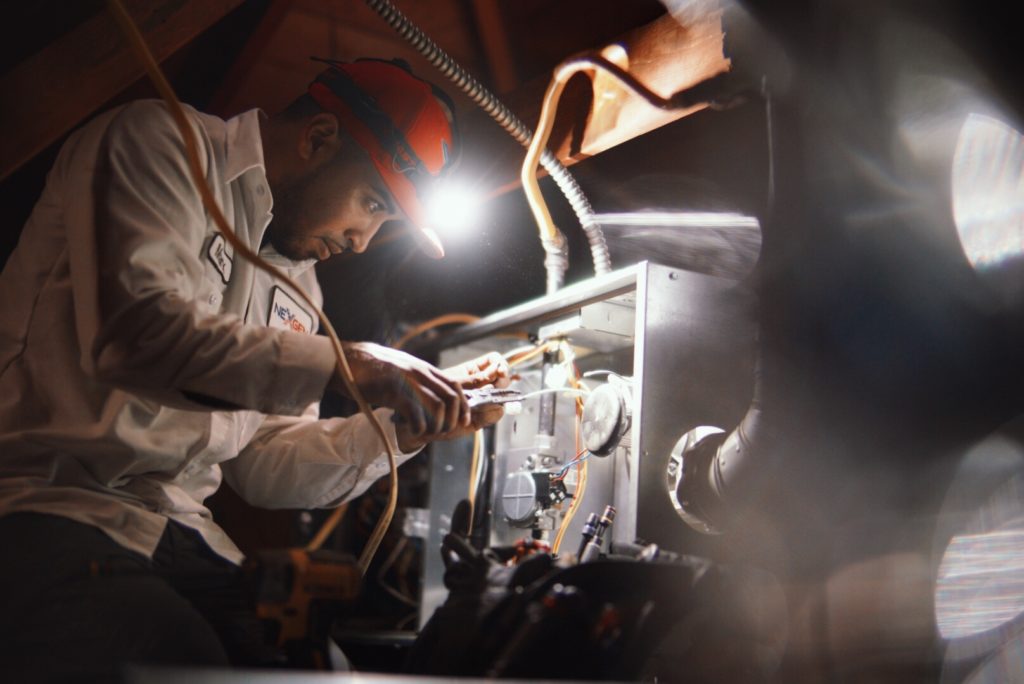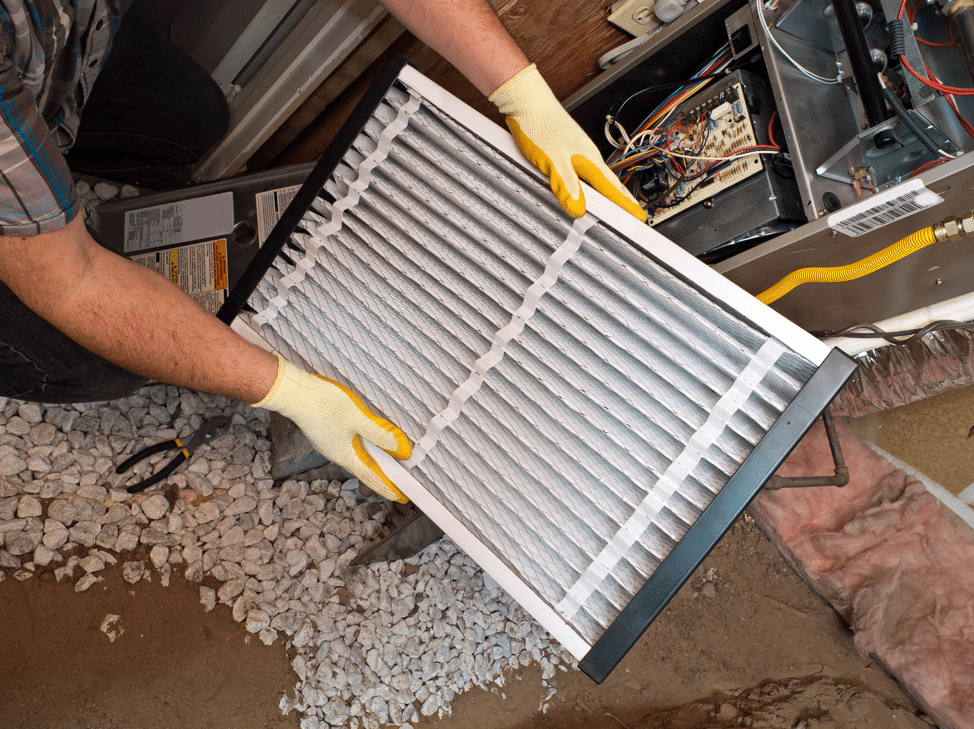Why is your HVAC system important when living in Los Angeles?

Heating, ventilation, and cooling, abbreviated as HVAC, is a system that cleans the air and offers warm air or cold air depending on the user’s climate requirements. In Los Angeles, HVAC systems are considered a worthy investment because of their incredible energy-saving principles.
If your HVAC system is damaged or is more than 15 years old, you must upgrade to a brand new, high-efficiency HVAC equipment. At NexGen, we offer professional repair and installation solutions on all AC systems in Los Angeles. We can assist you with all the heating and air conditioning systems requirements you need.
Pros of Having an HVAC System in Los Angeles
Because of advancements in technology, present-day HVAC systems can maintain a constant temperature in all the rooms in your home. Quality HVAC equipment has top-notch energy control and offers a consistent level of airflow. Pair this HVAC system with a smart thermostat and a comfort zone control system, and your home becomes an energy-efficient fortress. All of these also ensure you have a more comfortable and updated house to live in.
Lower Electricity Bills
An HVAC system is a piece of energy-efficient equipment that can significantly lower your electric bill to a great extent. Moreover, switching to a more advanced HVAC system reduces your carbon footprint, which is a significant step to preserve our unique planet from pollution.
Cleaner Air
Having a smart HVAC equipment enables you to have a constant flow of clean air. This helps to reduce stuffiness and drafts. Here at NexGen, we will install an HVAC system that ensures stable comfort levels and boosts the quantity of fresh air.
The Best Air Conditioning Service in Los Angeles
If you are hunting for dependable AC repair in Los Angeles to handle all of your heating needs, then NexGen is here to help. Our team can keep your HVAC system maintained and ensure your home is having a constant flow of cold air. We provide full heating and air conditioning services on residential properties within Los Angeles and the neighboring areas.
State-of-the-art Tools and Equipment
At NexGen, we have invested in great repair tools. We use state-of-the-art technology to make sure you get the best HVAC service. Our incredible team of technicians have extensive experience and use their remarkable skills to give you top-of-the-line AC repair solutions.
Exceptional Customer Care
We give our clients the number one priority always, and as our customer, we will handle your HVAC system repair with the professionalism that the project deserves. Our family will treat you like family. Our team commits to going the extra mile.
Request for a Free Estimate
Looking for the best air conditioning repair in Los Angeles? Call us at NexGen today for high-quality AC repair, excellent customer support, and affordable costs. You can contact us for a free consultation and estimate on all the AC services we provide.
Call NexGen Today
Our expertise and commitment to customer satisfaction make us the leading HVAC company in Southern California. To learn more about our equipment, services, and protection plan,
book an appointment online or call
888-277-0415.
How to Get the Most Out of Your AC System in Northridge

Are you one of the lucky residents that get to call Northridge home? Living in Northridge has so many advantages that the residents get to utilize! The city of Northridge is known for its friendly communities, wonderful parks, and even better schools! The weather in the area is always sunny and comfortable, it’s no wonder so many people choose to live in the area! The city is referred to as the “Jewel of the San Fernando Valley” and it’s easy to see why! The residents get to have the best of both worlds, living in Los Angeles without having to deal with all the hassles of city life, having the comfort and perks of a suburban community.
Wonderful Weather Year-Round
Even though the weather seems to be pretty perfect year-round, Northridge has their days of gloom, as well as their days of scorching heat. On these hot days, most residents tend to utilize their air conditioning to offset the uncomfortable temperatures outside. Having a working air conditioner and a comfortable home when you go come home from a long day of work is definitely one of the best feelings when it’s very hot outside. Here are a few key tips and tricks to help you get the most out of your air conditioning system this summer:
Replace your Filter Regularly
The filter for your air conditioning system is one of the most important pieces of the entire system. The filter allows for the system to receive the proper clean air it requires. When a filter begins to get clogged with debris, the amount of air flowing through the system diminishes greatly. This can cause the unit to work much harder to produce the same amount of cool air. Sometimes this can cause the system to break! Be cautious and replace your filter every 3 months to assure a clean healthy air conditioning system. We recommend signing up for an air filter delivery subscription, this will remind you to replace your filter frequently because you will receive filters in the mail every so often.
Service your Unit Frequently
The second biggest tip we can give to the Northridge community is servicing your unit regularly! Much like a car, it’s important to take care of any trouble when it’s still minor. This will avoid the problem increasing in magnitude and save you an expensive repair bill down the road. Having a professional evaluate your system will ensure that any problems will be caught before they become major issues. Regularly servicing the equipment helps to extend its life and ensure that it will stay in great condition for as long as possible. Our experts at NexGen only suggest the best possible solutions for your HVAC problems and our professionals do a great job keeping you, the customer, happy. Our goal is to provide our customers with optimal home comfort solutions paired with efficiency and safety.
Clearing Blocked Vents or Airways
Just like a clogged air filter, a blocked vent or airway can cause major issues with your HVAC system. It is best to check for blocked vents or airways every so often, but a great time to also check is when you run your air conditioning for the first time since winter. People usually go pretty long from when they last used their furnace to when they first use their air conditioner. During this time, things can move around in your system and that can obstruct the vents that provide cool air to your home. This can cause the unit to overwork and break. Also, if there is any furniture blocking the vents, take the time to rearrange the layout. Make sure that air can freely flow through the room!
Keep the Air Conditioner On
When those cool summer days roll through, it is actually best to leave your system on. When you turn your system off, it takes an excessive amount of energy to get the system up and running again once you turn it on again. If a cool spell rolls through, we recommend setting your thermostat to 78 or 79. That way, your system won’t run but it will be ready once that heat wave rolls back into town! This allows for the unit to work less hard to get the house back down to the desired temperature.
Use Ceiling Fans
One thing many people forget to do is using ceiling fans! Ceiling fans are especially good at moving cool air where it belongs! Running your ceiling fans while your air conditioner is on can actually allow for better airflow in the home, moving the hot air upwards while allowing cool air to stay where it belongs.
Close Vents Strategically
Have you ever had an issue where certain rooms are not receiving a proper amount of air while others seem to get a whole lot? This usually is an issue that arises around having your system incorrectly sized for your needs. But there is one tip that can help you get the air you want and need! Try strategically closing air vents in different areas of the house. If you are hanging out upstairs and are not receiving air, try closing some vents downstairs. This will allow for more air to flow upstairs, which can direct the air to where you want it to be! Sometimes this trick takes some practice to understand which vents to close to best adjust air flow, but practice makes perfect and in no time you’ll get the hang of it!
Condenser Needs Cleaning
Just as you dump your trash, your air conditioner condenser needs to be cleaned as well! Trash, sticks, dirt (you name it!) can get stuck to your condenser. It is best to frequently check to make sure everything is all clear! You can even use a garden hose to clear off the debris. Just be extra cautious with the fins!
These are just a few tips you can use to safely get the most out of your air conditioners! Put these tips into practice and see just how efficient your air conditioning system can get!
Call NexGen Today
Our expertise and commitment to customer satisfaction make us the leading HVAC company in Southern California. To learn more about our equipment, services, and protection plan,
book an appointment online or call
888-277-0415.
Southern California has the worst air pollution in the USA

If you've ever seen a brown haze of pollution hanging over your city, your most likely response may be, "Ugh. How can I avoid breathing that stuff?" But let's face it, even if you know it's a bad air day, you probably need to grab some sunshine, get in an outdoor run, or get to work.
Polluted air contains particulate matter, lead, ozone, nitrogen dioxide, carbon monoxide, and sulfur dioxide -- all of which can cause problems in people with allergies or asthma. Even if pollution is low, airborne pollen and mold can make a trip outdoors particularly daunting for people with respiratory conditions.
How to tell if it's a bad air day
The first step toward protecting your lungs is to know your city or town. More than 115 million people nationwide still live in counties with pollution levels considered potentially harmful to their health.
Air quality varies widely around the United States. Ozone, for instance -- which can pose a major problem for asthmatics -- tends to be more prevalent in urban areas like Los Angeles, though it can be found in suburban and rural areas as well. If you live in Fargo, North Dakota -- one of the cities with the cleanest air in the nation -- you are likely to breathe easier than if you live in Los Angeles, which has the highest ozone levels in the country.
Local weather stations often provide this information on their websites, and radio stations typically give ozone alerts. In addition, many websites can tell you if pollutants, ozone, or pollen counts are high in your area on any given day.
- AirNow.gov, a site run by federal government agencies, provides a daily Air Quality Index as well as other useful information on air quality.
- The American Academy of Allergy, Asthma & Immunology National Allergy Bureau has a daily mold and pollen report.
- The American Lung Association rates the air quality annually by state at stateoftheair.org.
- The Environmental Protection Agency has a feature on its website called My Environment, which gives you an up-to-date air-quality forecast for your zip code.
- Pollen.com offers a four-day allergy forecast using data from the National Weather Service.
However, it's not just pollen or air pollution that can trigger problems. Dr. Michael Benninger, M.D., the chairman of the Head and Neck Institute at the Cleveland Clinic, in Ohio, says changes in barometric pressure and temperature can also spell trouble for people with allergies to pollen and mold, people with severe sinus symptoms, and even people without allergies.
How to cope with bad air days
Once you've figured out what factors are most likely to pose a problem (usually by trial and error, or testing for allergies), and know the conditions in your area, there are several things you can do to cope.
One option is to reduce excessive exposure on days that might trigger symptoms. For example, Benninger recommends avoiding areas where pollen, mold, or other allergens are high. If you know that grass and trees are a problem, don't spend the day in a lush, tree-filled park; if you have to mow your lawn, wear a mask with a filter to reduce exposure to grass. Staying indoors with the windows closed and the air-conditioning on is also helpful, Benninger says.
Call NexGen Today
Our expertise and commitment to customer satisfaction make us the leading HVAC company in Southern California. To learn more about our equipment, services, and protection plan,
book an appointment online or call
888-277-0415.
Indoor Air Quality Testing Los Angeles
 How To Ventilate Your Home
How To Ventilate Your Home
Most home heating and cooling systems, including forced air heating systems, do not mechanically bring fresh air into the house. Opening windows and doors, operating window or attic fans, when the weather permits, or running a window air conditioner with the vent control open increases the outdoor ventilation rate. Local bathroom or kitchen fans that exhaust outdoors remove contaminants directly from the room where the fan is located and increase the outdoor air ventilation rate.
When To Ventilate Your Home
It is particularly important to take as many of these steps as possible while you are involved in short-term activities that can generate elevated levels of pollutants — for example, painting, paint stripping, heating with kerosene heaters, cooking, or engaging in maintenance and hobby activities such as welding, soldering, or sanding. You might also choose to do some of these activities outdoors if you can and if the weather permits.
More Home Ventilating Options
Advanced designs of new homes are starting to feature mechanical systems that bring outdoor air into the home. Some of these designs include energy-efficient heat recovery ventilators (also known as air-to-air heat exchangers).
Ventilation and shading can help control indoor temperatures. Ventilation also helps remove or dilute indoor airborne pollutants coming from indoor sources. This reduces the level of contaminants and improves indoor air quality (IAQ). Carefully evaluate using ventilation to reduce indoor air pollutants where there may be outdoor sources of pollutants, such as smoke or refuse, nearby.
The introduction of outdoor air is one crucial factor in promoting good air quality. Air may enter a home in several different ways, including
- through natural ventilation, such as through windows and doors
- through mechanical means, such as through outdoor air intakes associated with the heating, ventilation and air conditioning (HVAC) system
- through infiltration, a process by which outdoor air flows into the house through openings, joints and cracks in walls, floors and ceilings, and around windows and doors.
Infiltration occurs in all homes to some extent.
Natural ventilation describes air movement through open windows and doors. If used properly natural ventilation can at times help moderate the indoor air temperature, which may become too hot in homes without air-conditioning systems or when power outages or brownouts limit or make the use of air conditioning impossible.
Natural ventilation can also improve indoor air quality by reducing pollutants that are indoors. Examples of natural ventilation are:
- opening windows and doors
- window shading such as closing the blinds
Most residential forced air-heating systems and air-conditioning systems do not bring outdoor air into the house mechanically, and infiltration and natural ventilation are relied upon to bring outdoor air into the home. Advanced designs for new homes are starting to add a mechanical feature that brings outdoor air into the home through the HVAC system. Some of these designs include energy efficient heat recovery ventilators to mitigate the cost of cooling and heating this air during the summer and winter.
When adding outside air in order to dilute the pollution within your home is not an option, there are a few other options. HEPA air purifiers which are separate from your homes HVAC system can be effective. If this is not an option many newer homes have an air filter cabinet located on top of or underneath the furnace depending on whether it is an upflow or downflow model, putting a charcoal or other type of particulate filter in can help reduce pollutants within the home.
Call NexGen Today
Our expertise and commitment to customer satisfaction make us the leading HVAC company in Southern California. To learn more about our equipment, services, and protection plan,
book an appointment online or call
888-277-0415.
HVAC not working? How to troubleshoot HVAC problems

When warm weather hits and the heat is on, the last thing you want is for your air conditioning to be off. It’s essential to maintain steady comfort in your building to keep your residents content. Here are some of the most prevalent problems that you can avoid by following common sense operational procedures and with routine residential air conditioning maintenance.
The AC Won't Turn On
At the top of your list of fears when you initiate your air conditioning troubleshooting review might be that you’ll turn on the system and hear nothing and feel nothing. The lack of power could be something as simple as a blown fuse or a tripped circuit breaker, which means you’ll have to reset the circuit breaker or replace a blown use. It also could be the result of broken or loose wiring or thermostat problems.
Thermostat Glitches
If your thermostat is not working or if it is incorrectly calibrated, it may not tell the air conditioner to turn on. If you have set your thermostat to the lowest temperature setting and the system still does not start, it’s probably time to call your HVAC repair technician, who will likely have to recalibrate or replace the thermostat. The older, dial-type thermostats are more often subject to calibration problems, but sometimes the newer programmable thermostats are not easy to program. When doing air conditioning troubleshooting, you should consult your thermostat manual to make sure you have programmed your thermostat properly.
Air Conditioner Problems Are Not Cool – Low Refrigerant Equals Low Efficiency
While air conditioning troubleshooting uncovers an under-performing unit, that can be the result of low refrigerant. If the refrigerant level is low, it usually means it was either undercharged at installation or it has a leak. If you notice your building is not cooling properly or the air is somewhat sticky, a low refrigerant level could be the culprit. Without the right refrigerant level, heat and humidity cannot efficiently be removed from the air. The refrigerant is the lifeblood of your air conditioning unit and is akin to the motor oil in your vehicle.
Although your AC technician might discover a leak during the air conditioning troubleshooting process, unfortunately it’s not usually a matter of just topping off the refrigerant. When a vehicle frequently needs oil, it’s usually a sign of a bigger problem. Likewise, with an air conditioner system, low refrigerant is often the sign of a leak and you will need a qualified HVAC expert to fix it. If multiple leaks are detected, it’s possible that you may need to replace the unit.
Condenser Problems Will Heat Things Up
When drawing up an air conditioning troubleshooting plan, don’t forget to look at the condenser coil. The condenser has an important job to do. It is responsible for discharging the heat removed from the air by releasing it outside of the building. The condenser coil is part of your outdoor unit, which means it’s exposed to dirt, soot and assorted pollutants that make it grimy. If the coils are dirty, it will interfere with the transfer of heat and make your unit worker harder and add to the wear and tear on your system.
It's Getting Hot In Here – Ironically Could Mean A Frozen Evaporator Coil
While embarking on your air conditioning troubleshooting mission, you should consider that your evaporator coil is the reason for warmer temperatures than you would like. This coil contains refrigerant that absorbs heat. When airflow is diminished, a layer of ice can form on the evaporator coil. If this occurs, you could end up with warm air or no air from your air conditioner supply registers. The restricted airflow could be the result of dirty air filters, low refrigerant or obstructed return air in your ductwork, which brings us to our next problem to look at when you’re conducting your air conditioning troubleshooting project.
Call NexGen Today
Our expertise and commitment to customer satisfaction make us the leading HVAC company in Southern California. To learn more about our equipment, services, and protection plan,
book an appointment online or call
888-277-0415.
Window Air Conditioner Maintenance Checklist

The window air conditioner offers an efficient, convenient means to cool a room or two in your home. Properly maintaining your air conditioner will improve efficiency, reduce energy consumption and prevent costly repairs and downtime. Before performing any maintenance or repair work, be sure to review your air conditioner's owner's manual for instructions.
1. Clean the air filter monthly
On most models, the air filter is easily accessible by removing the front panel. Remove the filter and clean it gently with a combination of warm water and dish soap or white vinegar. Let the filter air dry completely before reinstalling it. These should be cleaned once per month during the cooling season. If you have pets or allergies, consider cleaning it more frequently. If the filter has tears, holes or other damage, it should be replaced. If your unit has a foam filter, you can purchase replacement electrostatic filter material and cut it to accommodate the exact size of your model.
2. Check for insect/animal nests
If you've left your air conditioner uncovered in your window or wall over the winter, you'll need to check for wasp and bees' nests inside of the unit. Avoid problems with this in the future by storing your window air conditioner in a protected area such as a basement or utility room during the off season. If you must leave your AC in the window, use an air conditioner cover.
3. Clean the condenser coils once per season
Over time, dust and dirt will build up on the inside of the air conditioner's condenser coils. This build up will require your AC to work harder to remove heat – increasing energy consumption and your monthly electric bill.
At the start of every cooling season, clean the condenser coils. You'll need to remove the air conditioner cabinet completely in order to access the coils. They can be cleaned by blowing compressed air at them or by using a soft bristle brush and a spray bottle of household cleaner to wipe the dirt off.
Take great care in removing the dirt. If you accidentally bend or dent the aluminum coil fins, use a handy fin comb to straighten out the fins.
It is also important to remove dirt or lint build up at the bottom of the air conditioner so the condensate water will be picked up by the condensing fan blade slinger properly.
4. Inspect cooling coils for frost or ice buildup
If the temperature outside the room where the air conditioner is placed becomes cool (approximately 60 degrees Fahrenheit or 15 degrees Celsius or lower), check the coils on the front of the air conditioner for icing. Ice buildup on coils means the temperature is too low for proper operation of the unit. You should use it only when the outdoor temperature rises above 60 degrees Fahrenheit or 15 degrees Celsius.
By following these four simple maintenance tips, you can save yourself a lot of discomfort and money, ensuring your window unit works all summer long.
Call NexGen Today
Our expertise and commitment to customer satisfaction make us the leading HVAC company in Southern California. To learn more about our equipment, services, and protection plan,
book an appointment online or call
888-277-0415.
10 Steps to Save Energy & Money on Your Air Conditioning in Los Angeles

There will be times this summer in L.A. where air conditioning is a must. However, this can lead to all sorts of fights over the thermostat--or lots of unnecessary money down the drain. Here are some ways to make sure you’re getting the most out of your air conditioning unit.
1. Use blinds or shutters.
If you have window coverings, use them strategically. Keeping blinds and shutters closed when the sun directly hits your windows can make a world of difference. In Los Angeles, depending on which direction your windows are facing, this will be most of the day. This means using less air conditioner power to keep your home cool, and therefore less money and energy spent on cooling.
2. Use a ceiling fan.
The National Resources Defense Council (NRDC) notes that using a ceiling fan can help a room feel up to ten degrees cooler. When you partner this with air conditioning, you can use less energy for the same effects.
3. Get a smart thermostat
If you don’t have a smart home thermostat yet, they’re game changers, especially in places like L.A. where it’s warm most days. These thermostats allow you to control your HVAC system remotely, meaning that you can turn off the air conditioner while you’re away. Do you sometimes forget to turn it off before you leave? Do you not want to walk into a hot home after work? Then a smart thermostat can help you.
4. Get your air conditioner serviced
Your air conditioner can’t do its job if it needs cleaning, repair, or upgrading. Contact us today at NexGen, and we’ll take a look at your HVAC system, and help you get it up and running to its full capacity. When your system is more efficient, you can cool your home with less energy and therefore less money.
5. Avoid using certain appliances
Ovens, certain lights, and stovetops all can add heat to your home. Take advantage of the summer and take the grilling outside, or use the microwave. Try to keep as many lights off as possible--every little bit helps.
6. Check your home insulation
No matter how efficient your air conditioner is, all of that cool air can escape through cracks in your home. Have your insulation checked for gaps, holes, or cracks. Whether you use polyurethane foam, natural insulation, or kingspan insulation, it’s only as effective as it is solid. Seal any cracks with caulking or repair, and rest assured that you’re getting the most out of your system!
7. Use an energy-efficient air conditioning unit
Consult EnergyStar to find HVAC systems or air conditioners that are proven to be efficient. They need less energy to work well, which means that you save money.
8. Place your home thermostat correctly
If your thermostat is near the kitchen or a hot window, your air conditioner may be turning on unnecessarily. Consult an HVAC contractor about where to place your thermostat so that it gets an accurate reading, and cools your home just enough.
9. Never start low
You never want to put your thermostat super low when you first start it. It can be tempting to walk into a hot house and turn it as low as it’ll go, but it won’t do you any good in the long run. Instead, start by going five degrees cooler than the current temperature. This will use only as much energy as you need--and if you’re still warm, you can always go lower!
10. Check your HVAC ducts
Finally, be sure to check your ducts. If they haven’t been looked at in a while, they may have leaks or obstructions that are preventing you from getting the most out of your air conditioner. Schedule a duct inspection and cleaning, or keep an eye out yourself.
If you follow these tips, you’ll be saving money and energy this summer while still staying cool. Over here at NexGen Heating and Air, we’re always happy to help.
Call NexGen Today
Our expertise and commitment to customer satisfaction make us the leading HVAC company in Southern California. To learn more about our equipment, services, and protection plan,
book an appointment online or call
888-277-0415.













